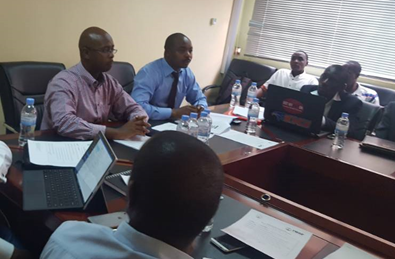Four months after the cabinet approved the Data revolution policy, the National Institute of Statistics of Rwanda (NISR) initiated discussions with stakeholders to discuss how this policy will be implemented to boost the use of other sources that may generate statistics for evidence based decision making.In this context, NISR organized the first technical meeting on 20th July 2017, at its HQ with participants from government, private sector and academia, to discuss how a convenient environment can be built to start using big data analytics in Rwanda as one component of the implementation of the data revolution policy.
In his remarks, Mr Yussuf Murangwa, the Director General of NISR, requested participants to put more efforts in brainstorming on how the data revolution policy can be effectively implemented and on information sharing about various existing initiatives of big data analysis. He also requested participants to seriously always consider the issue of privacy and confidentiality during all discussions on bid data analytics.
Mr Dominique Habimana, the director of Statistical Methods Research and Publications at NISR, presenting the data revolution policy in Rwanda and emphasized on the government commitment in investing in the development of big data analytics in Rwanda. He shown that there are a big number of data sets kept by public and private institutions and how these datasets, if published and shared, may be used by researchers to produce statistical information for supporting decision making and create jobs.
During this meeting, participants shared quick wins initiatives in the area of using big data analytics to develop systems that may provide solutions to existing problems. The Toyota Group Ltd presented the system they are developing that will help the monitoring of road traffic in Rwanda indicating traffic jams using mobile phone’s data analysis.
The Carnegie Mellon University (CMU) demonstrated how satellite imagery can be analyzed to monitor crop production in Rwanda. In their presentation, they also illustrated that it will be possible to assess the correlation between rainfalls and crop yield and linear assessment of yield against land size.
The Rwanda Utilities Regulatory Authority (RURA) requested to review frameworks in place that may be used to regulate the use of big data in Rwanda. RURA insisted on coordination and collaboration between all actors for the development of frameworks that will guide the implementation of the policy. As an example, RURA is in collaboration with MYICT to initiate the Open Data Platform which is a web based platform where all public and private institutions will be facilitated to share data sets that will be accessed either for information or generation of useful statistical insights.
The Rwanda Information Society Authority (RISA) on their side informed participants that the data security and backup mechanisms should be taken as a serious issue to ensure the adequate use of big data in Rwanda. Data generation/collection, data sharing and access, Data origin verification, the size of data sets and /or databases, if not consistently monitored and tracked, they may conduct to the biased and harmful use of big data analytics and then lead to inefficient and ineffective decision making with all related bad consequences.
As conclusion, all participants strongly recommended the involvement of various stakeholders from private and public sectors, researchers, civil society and others in the development of rules and regulations, and other implementation strategies. They suggested that relevant mechanisms should be in place to insure continuous collaboration and information sharing on the advancement of data revolution policy.
By: Claude NYIRIMANZI

